Everyone said this is a mission impossible
Iran navy chief speaks about Iran maritime achievements in interview with the Tehran Times
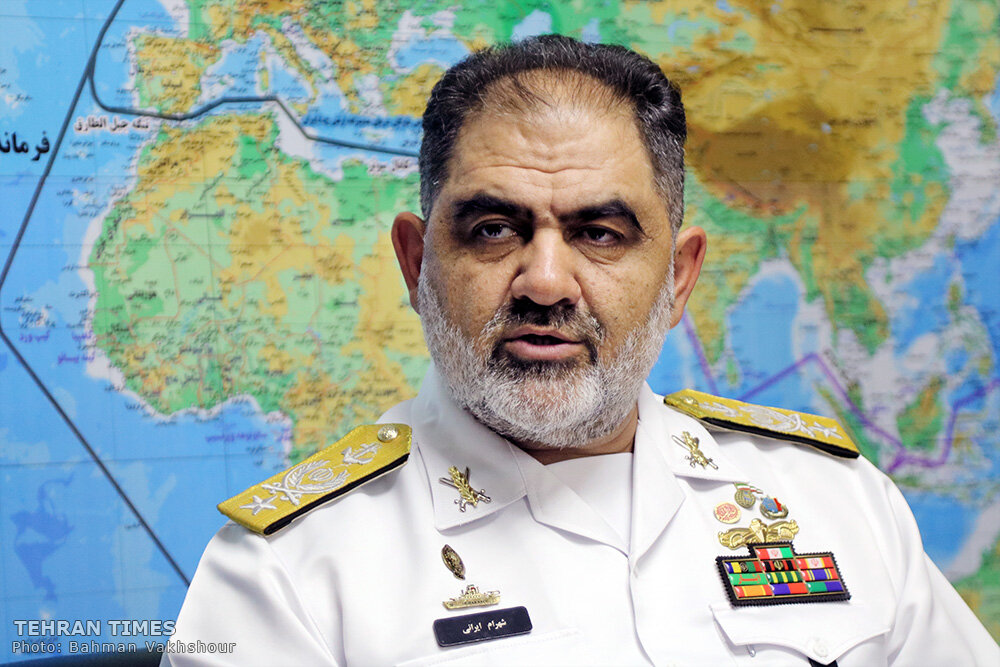
TEHRAN – Shahram Irani, commander of the Iranian Navy, has praised the Iranian navy group which sailed around the world in a historic mission. Rear Admiral Irani said everyone doubted the mission but Iranian sailors traveled around the world successfully.
In an extensive interview with the Tehran Times, Irani spoke about many things, including the maritime security initiative Iran has recently presented to the countries of the region.
The navy chief said almost all the countries of the region welcomed the Iranian initiative. “We understand each other much better in the sea as regional countries, and this can be a central point or a focal point for creating a coalition or coordination and convergence with a priority of establishing security in the economic sphere. The concept is to provide peace and calm to the people of the countries in the region,” he told the Tehran Times.
Following is the full text of the interview:
Q: Recently, you said that Iran has a plan to form a naval coalition to ensure the security of waters in the region. Please give provide more details about this plan, and the countries that may have been negotiated with.
A: While the enemy always focuses on creating divisions among the countries of the region to achieve its goals, the Islamic Republic of Iran, especially its armed forces, has always sought convergence.
The sea can be used as a great common resource and promote affinity (between littoral states) and certainly one of its benefits is economic interests. Almost all the countries in the region, which are mostly Muslim, border the sea. The practical manifestation of all these commonalities is the sea. It means that there is no obstacle or limitation. In other words, when you set sail in the sea the work of the naval force begins.
“Iranians should be proud of themselves.”Well, if you want to make coordination at land borders, it will be very difficult, but at sea, it is very, very easy, and there is no difficulty. There are reasons for that. Your economic interests come to an end at land and air borders, but it is not so at sea. In the sea border, the greatest economic resources lie, and this is for everyone, not just for us.
Therefore, this common point is connected to the marine economy. And wherever there is marine economy, the concept of it is money and wealth, and certainly alongside it is theft and terrorism. That is, the first step that terrorists or terrorist organizations take is here.
The enemies' conspiracy is to take the greatest advantage of these resources that lie there.
Now, where are we on the earth and its seas? In the north of the Indian Ocean, which is famous as the paradise of pirates because a significant portion of trade exchanges takes place in this area.
What is the main feature of each country in the sea? Its naval power. And one of the main features of this naval power is maritime security that military forces are definitely responsible for.
We understand each other much better in the sea as regional countries, and this can be a central point or a focal point for creating a coalition or coordination and convergence with a priority of establishing security in the economic sphere. The concept is to provide peace and calm to the people of the countries in the region.
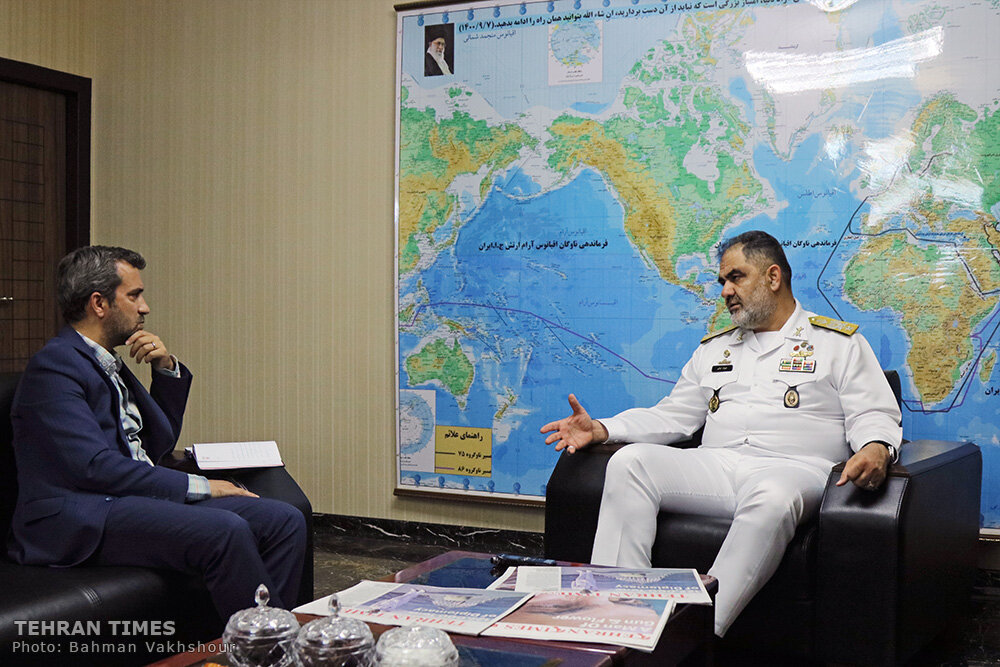
Usually, in the sea, there is either bilateral, trilateral or multilateral communications or connections. Also, the Indian Ocean Naval Symposium (IONS) hosts meetings between Navy commanders. (IONS is a voluntary initiative that seeks to increase maritime cooperation among navies of the littoral states of the Indian Ocean Region by providing an open and inclusive forum for discussion of regionally relevant maritime issues.)
Q: Is this meeting held annually?
A: Commanders gather every two years. It (IONS) has three committees that holds annual meetings. The main committee is the Security Committee, another is the Friendly Humanitarian Actions Committee, and the third is the Information Technology Committee. The Security and Humanitarian Actions Committees are headed by the Islamic Republic of Iran, and the Navy of the Islamic Republic of Iran's Army is responsible for it.
“If we can firmly join our hands and our hearts, we will definitely accomplish great things.”
It is the sixth year that we are in charge of the Security Committee and it is the second year that we are in charge of the Friendly Humanitarian Actions Committee. Usually, the presidency of any committee is not more than one term. But in the Security Committee, since Iran's performance has been good, our presidency has been extended for three terms. In the Friendly Humanitarian Actions Committee, we applied for the chairmanship because we had and have this capacity to help. For example, if an unfortunate natural event happens in a country in the region and requests help, we have this capacity in the Islamic Republic of Iran to reach them through the sea with our own speed and help them.
The main topic is maritime security, which is now established. In 2022, that its report was released almost a month ago, Iran's submarine was once again appreciated for its effective role in ensuring commercial shipping security.
There is a very important maritime triangle that connects most Muslim countries. The components of this triangle are the Bab-el-Mandeb Strait, the Strait of Hormuz, and the Malacca Strait. The Suez Canal is also a communication route. Well, this idea crossed our minds that we could put these countries together in the maritime field given.
Q: So, the operational range of this coalition form this triangle, right?
A: Yes, the major part of it is this (triangle). Ensuring security in the northern Indian Ocean, specifically this triangle, is the main goal. That's why we also brought up the discussion of (including) India and Pakistan (in this coalition) because it ends at Malacca. Certainly, Sri Lanka is also interested in joining this coalition.
We have also established a new connection with extra-regional countries. We hold joint annual exercises with China, Pakistan, and Russia. This year other countries have also been invited to participate. They participated as observers last year, and this year they will send their warships.
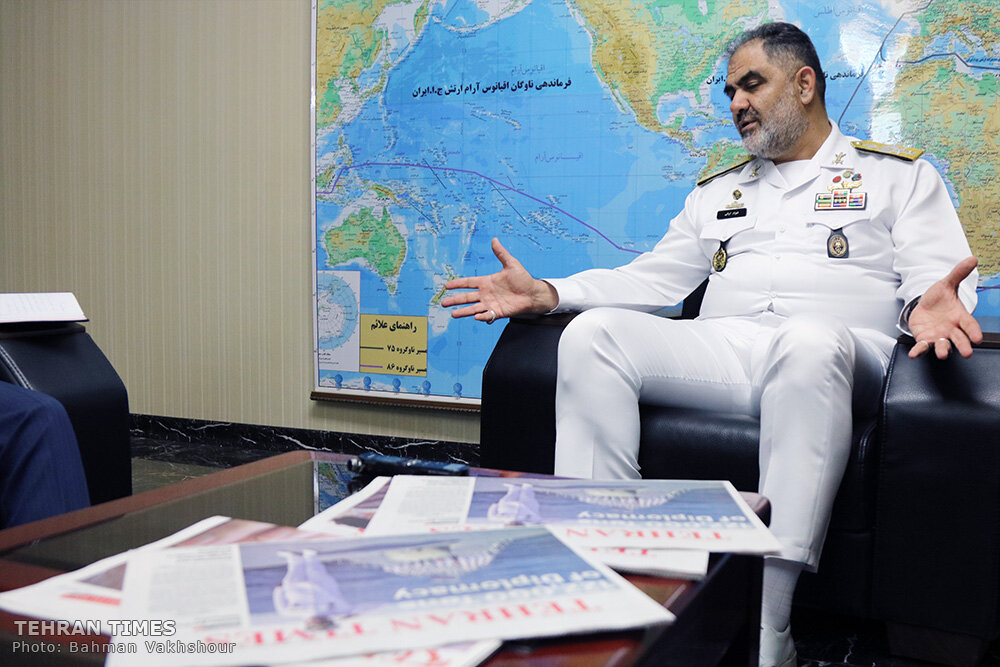
Q: At what stage is the coalition?
A: Its initial steps require a series of communications. The discussion we have in the sea is about a “common language” that is now being prepared in the Navy and (its content) will be sent to the respected individuals. Its structure and framework will be sent. A survey will be conducted, and in a meeting in which all naval commanders will gather we will seek to get its final approval and practically start its implementation.
Q: Are there any countries that have expressed their approval of the coalition?
A: Respected individuals, military commanders or their deputies, or mostly high-ranking staff members attend various meetings. Yes, this issue has been raised with them, and everyone has welcomed it. Because it has benefits for the region and will definitely be a step forward in the field of naval force.
Q: Recently, we had a joint exercise with Russia and China. Will these exercises be held in the future as well?
A: Yes, it is held annually and is part of the working calendar of all three countries. And it is planned to be held again, and more countries will also be involved.
Q: What is the status of our naval cooperation with Russia and China?
A: We are currently at the highest level of naval interaction. I say the highest level because it includes all areas. We work together in the field of training, holding exercises, and military championships. The latest thing added to this area were naval patrols.
Q: Joint naval patrols?
A: Yes, joint naval patrols that have been held and will be strengthened in the next stages, and its concept is that in any region that the three countries determine, this patrol will be carried out jointly.
Q: Also, what equipment will be delivered to the Navy? Can you give us some information?
A: Our equipment is in specific areas, both in surface, sub-surface, and air domains, which we call the “main platforms”. These are the main platforms that we will soon see new equipment both in the north (Caspian Sea) and south (Sea of Oman and northern Indian Ocean. In addition, equipment such as missile systems, which we will also see soon.
The important point is that all of these (equipment) are domestically produced.
Q: Can you specify a particular case?
A: In the field of naval technology, a destroyer will definitely be added soon. In the underwater field, we will be provided submarines. And in the aviation field, our priority is drones, which are being fortified. In the missile system field, coastal missiles with very long ranges will be delivered on time, as well as surface-to-surface cruise missiles and surface-to-air missiles.
Q: One of the very remarkable activities of the Navy that happened during your commandership was a trip around the world by the 86th naval group. Please give some details about the coordinates and dimensions of this historic voyage.
A: Regarding the operation of the 86th naval fleet, which was carried out with the code 360 around the globe, there are several significant points. The main point is that from the perspective of all experts, both friends and foes, whether military or non-military, this voyage was impossible, which was a very, very important issue, and everyone, not only before, not only during the voyage but also after the voyage, believed that this task was impossible. I say after the voyage because there are “strategic ambiguities” for them.
The second point is that the focus of this mission was to ensure that all equipment used in the sea, in particular the destroyer that was to carry the flag, must be entirely Iranian made.
“A new destroyer and submarines as wells as long-range missiles will be delivered to the Navy soon.”In one of the countries, in order to prove that something is just manufactured in Iran, we requested a spare part and said we need it. After two or three days, they said there is no such thing in the world! We checked and found that there is no such thing in maritime industries. We said it's true that it doesn't exist, but it exists today in Iran, which was a great honor and pride for the children (sailors).
Also, our presence for the first time in countries which had been subjected to negative propaganda about us, especially about armed forces, was surprising. They had imagined that the Iranian Navy, especially its sailors and naval officers, were harsh and unreasonable persons. They had such misconceptions.
Also, in the initial presence and interactions, they admitted their mistake in the shortest possible time. The same (Persian) proverb that says "what we thought and what happened!", they said what “we thought was really wrong,” and “we didn't know that you are such persons”. Are Iranians really so? In any country, armed forces are a symbol of that country. They are representatives and symbols of the people and culture.
This was while the average age of the dear ones (personnel) who participated in this naval mission was under 30, and they were enthusiastic youths. What was even more interesting was that about 20 to 25 percent of our young personnel were very young, between 18 and 22 years old, who were experiencing the sea for the first time.
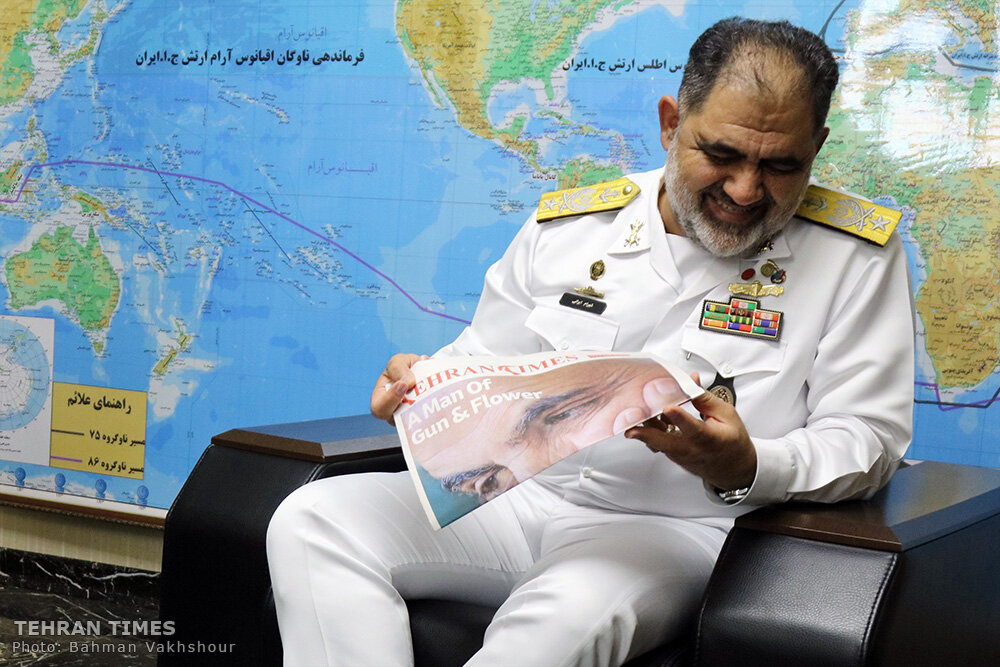
Q: Does that mean it was their first naval mission?
A: Yes, it was their first naval mission and it evoked scenes of that happened during the eight years of the “Sacred Defense” (Iraq’s war against Iran in the 1980s) in which the young men were aware that the mines that had been planted would take their lives, yet they defied all the risks and sacrificed themselves (by detonating the mines) and facilitated the path for others (soldiers on the warfront) to pass. They (navy personnel) went with the same mindset. With the slogan "our path is the path of (Imam) Hussein (AS)" and with the same spirit, they went sailing.
Well, when they arrive in countries like Brazil, South Africa, or Indonesia, in which cultures are different, surely a young person is expected to do some kind of misbehavior. It is natural as they are in a new environment.
Just as there had been negative propaganda against us there, those propaganda had left their effects on that culture and they were looking how the Iranians would behave, but we did not notice even a single misconduct. And this was very surprising and impressive for those societies that how they have been trained. For example, they were holding a congregational prayer on the wharf of Rio de Janeiro along an enthusiastic cleric who was accompanying them. The scene was very cheerful. Everyone was in good spirits, and the fatigue of the sea did not affect them.
Alongside that, almost in all ports, the children (personnel) had this request to stay there more, which usually does not exist anywhere in the world. That is, sailors want to leave the dock as soon as possible because of the conditions they have, but for us it was the opposite, and they requested that we like to stay here more, visit more places, and more visitors come to see our capabilities.
We had the most visits to this mission from (military) units. The dialogues that were exchanged, especially by the hosts, were the dialogues that showed the dignity of the Iranian people. For example, in South Africa, this dialogue was raised that you (Iranian sailors) promoted the dignity of the Islamic world.
Q: Was it Cape Town?
A: Yes, it was Cape Town. Because there was a Shia mosque there and both the Sunni community and the Shia community were of interest to the naval fleet. They were invited to the Shia mosque to hold prayers there. They held a Quranic recitation gathering for the Sunni community in the Shia mosque. It was during the blessed month of Ramadan. They never thought that a group of young men would come and fast in the sea during the holy month. It was very strange for them that they were fasting.
Alongside that, the enemy exerted all its power to prevent this interaction and diplomacy. In all ports, it (the enemy) put maximum pressure on those governments to prevent the fleet to dock and this interaction happen. It imposed sanctions on our warships, that is both warships (Dena and Makran). Of course, that sanction was self-invented. It had no place in the international community and international law.
The enemy did its best to bring this naval operation to a failure, but it was not successful. It was not possible because there was a coordinated action inside the country, an action that all people strongly supported it. The forces of these two warships were from 29 provinces of the country. In fact, a small Iran with different cultures and customs were aboard the warships.
Q: Were there 350 crew?
A: Yes. All ethnicities and religions were together.
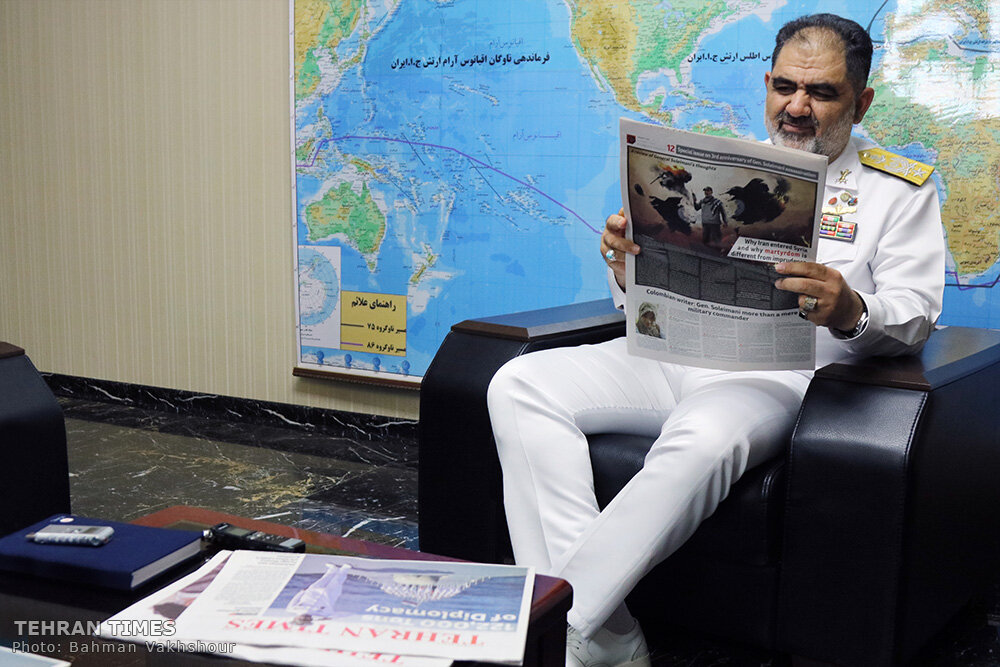
Q: What was proved after this naval trip?
A: In an occasion in 2009, the Supreme Commander-in-Chief used the beautiful phrase of "strategic naval forces". It meant that the Navy is a strategic force. Now with the accomplishment of the mission, it was practically proven that the Navy is strategic.
Today, we have a new thing not only for ourselves but also for the world because everyone thought that 360-roundtrip by the 86th fleet was impossible.
Q: What is the plan and role of the Navy in developing the Makran coasts?
A: When you say the Makran coasts, it means the Indian Ocean, the Atlantic Ocean, the Pacific Ocean. Actually, this is the meaning of the Makran coasts.
In terms of security, we are definitely responsible for the Makran coasts. We are also the only organization that implemented the orders of the Supreme Commander-in-Chief 100 percent, and since 2009 we have settled along the Makran coasts. And not only ourselves but our families have settled there. When we say families, it means they have come from all cities and provinces of Iran and settled on the Makran coasts.
However, what we are looking for our dear and respected personnel and families on the Makran coasts are definitely human development indices, because they have certain needs in terms of health, education, technology, travel and traffic, and various other things. All of these make us a pioneer in the development of the Makran coasts, even in the cultural field. So our plan is to definitely play our main and pivotal role.
Q: If you have any points to make at the end, please mention.
A: The point I would like to make here is that all Iranians should be proud of themselves, their system, and know that all these great things that have been done in this country, especially in this historical period, have been due to the blessings of the jurisprudence and the Supreme Commander-in-Chief, and never forget that. It is definitely the product of solidarity and empathy, and if we can firmly join our hands and our hearts, we will definitely accomplish great things.
